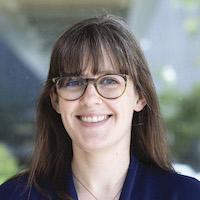Research spotlight: Corinne Jones
Corinne Jones is a licensed and certified speech-language pathologist who holds joint faculty appointments in the Dell Medical School and Department of Speech, Language, and Hearing Sciences at The University of Texas at Austin.
Her research is designed to better evaluate swallowing disorders, also known as dysphagia, and develop more non-invasive approaches to dysphagia rehabilitation.

"During my speech-language pathology master's program at the University of Wisconsin-Madison, I had a formal course in swallowing disorders, which is a course I now get to teach at UT. Through that course and my clinical externships, I discovered that evaluation and treatment of swallowing disorders just kind of clicked with me," Jones said. "The evaluations are image-based, and as a visual person, I really liked being able to spot where the issue was."
Dysphagia is a relatively new aspect of the speech-language pathology field; Jones said during her clinical work she often encountered issues for which there was not clear diagnostic guidance or relevant literature to inform decision-making.
"Those questions led me back to getting a Ph.D. and developing my independent line of research in swallowing disorders," Jones said.
Jones recently published an academic article in the Journal of Speech, Language, and Hearing Sciences Research regarding functional force and swallowing muscles in the throat which could have implications for clinicians as they recommend swallowing exercises.
Functional reserve is the difference between what is needed to perform a physical task and the maximum output of that system. For example, the pressures created by the tongue during swallowing are substantially less than the maximal force the tongue can create. With healthy aging, the maximum force declines in the tongue, but the pressures during swallowing do not. This informed speech-language pathologist's recommendations for tongue strengthening exercises in older adults with swallowing disorders.
Jones' paper, however, is the first to show that this pattern does not appear in the swallowing muscles in the throat.
Q&A
Based on this finding, what do you need to study next to better inform treatment? If there isn't an age-related decrease in functional reserve in the pharyngeal muscles, then the ability for strengthening the pharynx to reduce the risk of dysphagia is likely not worthwhile. Thus, more effort is needed in exploring our ability to train skilled movement of pharyngeal swallowing muscles.
Does dysphagia typically develop over time or does it also happen with sudden onset? Stroke is a very common cause of sudden-onset dysphagia, wherein a person may have functional (but aging) swallowing one day and severe dysphagia the next. On the other hand, Parkinson’s disease is a slowly-progressing neurodegenerative disease that leads to a gradual onset of dysphagia.
Could certain populations be more at-risk for dysphagia? Aging certainly puts individuals at risk for dysphagia, due to the anatomic, sensory, motor, and neurologic changes that occur with healthy aging, and that aging puts individuals at risk for many conditions that cause dysphagia, like stroke, neurodegenerative conditions, and head and neck cancer. On the other side of the spectrum, many developmental conditions put individuals at risk for dysphagia. For example, premature birth is a risk factor, as premature infants have less time for sensorimotor and neurodevelopment required for safe swallowing.
How were you first introduced to swallowing disorders, and why were you interested to learn more and contribute to research and treatments? I was first briefly introduced to swallowing disorders as an undergraduate doing a minor in Speech, Language, & Hearing Sciences at Boston University. Honestly, I was a little grossed out by the thought of getting up close to patients' mouths and throats. Then, during my speech-language pathology master’s program at the University of Wisconsin-Madison, I had a formal course in swallowing disorders, which is a course I now get to teach at UT. Through that course and my clinical externships, I discovered that evaluation and treatment of swallowing disorders just kind of clicked with me. The evaluations are image-based, and as a visual person, I really liked being able to spot where the issue was. Also, the ability to get a patient to eat and drink their favorite things again is so immensely rewarding. However, swallowing is a relatively new part of the field of speech-language pathology, so there are a lot of unanswered questions that I ran into during my work as a speech-language pathologist.
